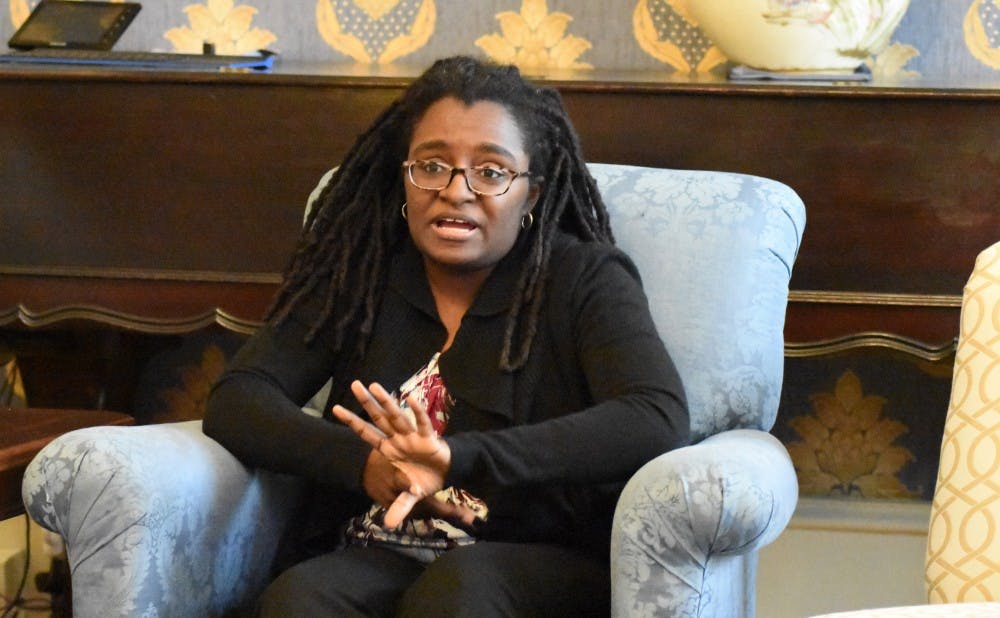When Jillian Johnson studied at Duke about 20 years ago, she never explored Durham beyond two blocks away from campus. Now as Durham’s mayor pro tempore and at-large city council member, Johnson strives to make Durham a better place to live.
“The essence of democracy is that the people who are closest to the problem are the ones to come up with the solutions,” said Johnson, Trinity '03, at a panel Tuesday.
Johnson said that she developed many of the skills she uses for her current post during her four years at Duke—particularly through her participation in student organizations, such as Duke United Students Against Sweatshops. Because students come from different backgrounds and flow year by year, maintaining organizations then was hard, she added.
“I learned how to organize people in a really difficult-to-organize environment [when I was at Duke],” Johnson said.
Serving in the public sector is different from organizing students because her colleagues nowadays are generally older, less diverse and less progressive, Johnson said. As a black female public servant, she has encountered many doubts since she first ran for office.
“People would ask me ‘are you sure you got enough time as you have two kids at home’,” Johnson said. “There was another candidate who also had two kids at home but they would never ask him that question.”
Johnson has recently become an advisor to Rise to Run, a movement to mobilize progressive young women to run for office—with the hope of incorporating more young voices in the public sector. She added that she often finds it hard to move forward her political agenda in an inclusive way, without alienating the vast majority of the community.
Late last year, residents of the Old West Durham neighborhood proposed a Neighborhood Protection Overlay—a resident-initiated zoning tool which helps preserve the established character of an existing neighborhood—to prohibit the establishment of larger homes and the renovation of existing properties so as to preserve historic relics. Most property owners are opposed to the proposal, because they wish to tear down the properties and transform them into ones they can rent out, Johnson said.
The zoning proposal will potentially be in conflict with the City Council's ongoing efforts to increase housing affordability. With the proposal, investors will not be able to build duplexes, triplexes and other facilities such as converted garages. Down the line, this would make it harder to accommodate more residents in this area.
Adding to the issue of housing is Durham's rapid growth due to a migration trend from the Northeast and the Midwest, Johnson said. Durham is expected to have a population growth rate of 70,000 by 2030.
She noted that people move to the South because they wish for less expensive housing and a less urban and more relaxed lifestyle, while actually making housing more expensive and leading to more traffic.
“When people move here from big cities, they bring the city problems with them,” she said.
To meet these growing demands, the city is taking steps to increase accessible and affordable living spaces.
“People having places to live is a critical city function and a fundamental human right,” Johnson said. “If some of our measures [to increase housing ability] upset some of the residents, we need to enable more conversations in the community and address their concerns.”
Boarding houses are one tool to increase housing in Durham. However, residents in the neighborhood tend to be against it because lodgers are often low-income people of color or college students who party and drink a lot.
Johnson said the city council’s explicit permission of boarding houses will inevitably raise worries among residents.
Johnson is also working to bring more young candidates from diverse backgrounds—including women, young people and people or color—into the public sector.
“We are not committed to put any specific candidate into the position,” Johnson said. “But it is critical for the pool itself to be diverse.”
Mauricio Castro, a Latin American studies postdoctoral fellow, said he is teaching a course on Latin history in Durham and came to the event hoping to learn more about Durham’s history and politics.
“As faculty and students, we tend to be clustered in the academic realm,” he said. “I find it valuable to learn how city officials are doing their work in the real world.”
Get The Chronicle straight to your inbox
Signup for our weekly newsletter. Cancel at any time.

